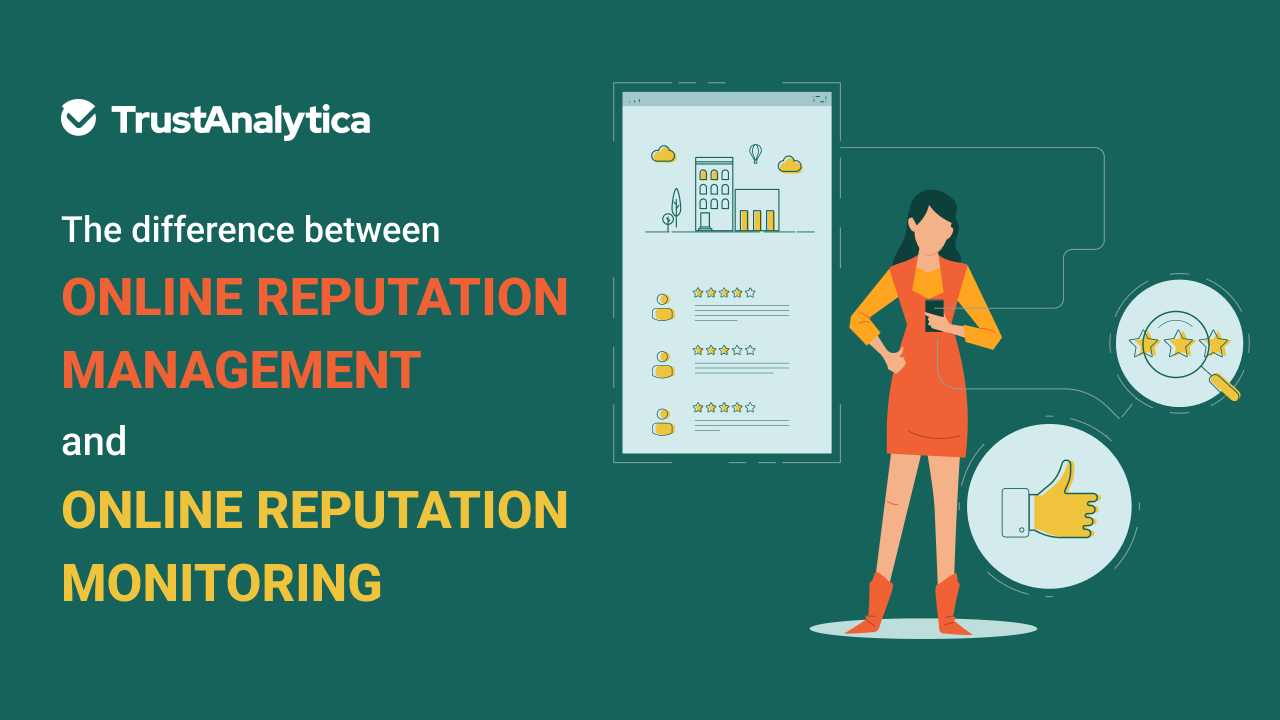Updated: 30th November, 2023 The online world is moving at an unprecedented pace. It has become hard for both professionals and laymen to know the relevant terms and phrases of the day. Since the former is more concerned about those changes, and even bringing them up to some extent, they should know the differences between […]

Updated: 30th November, 2023
The online world is moving at an unprecedented pace. It has become hard for both professionals and laymen to know the relevant terms and phrases of the day. Since the former is more concerned about those changes, and even bringing them up to some extent, they should know the differences between various terms and their manifestations.
This blog post is dedicated to distinguishing online reputation monitoring from online reputation management. Many make the mistake of either using them interchangeably or denoting a thing belonging to one phenomenon to another. This is where all confusion and errors will end.
This involves actively tracking and observing what people are saying about a company or brand online. It focuses on gathering information and feedback from various sources, such as social media, review sites, forums, and news articles. Reputation monitoring is like being the “eyes and ears” of the operation, providing real-time insights into public sentiment.
The online world is rife with chatter almost every hour of the day. It is up to the professionals to set up limits and constraints for brands so that they can collect meaningful data from concerned sources only. Later on, this will be put into practice by them for better online reputation management.
Almost like virtual eavesdropping, brands need to be on top of the chatter and developments unfolding in the online world. For that, online reputation monitoring is the practice carried out by almost all brands.

In this section, we will take a look at how it is done and then top it off with the relevant tools to do it more efficiently.
Social media is the new town square. People flock there in billions every month and exchange ideas, goods, and even conflicts. According to some reports, there are over 4 billion active monthly users on Facebook alone. Since people love to show off, promote, and vent about brands they love or hate, online reputation monitoring should have a lion’s share of social media channels. This can be done by having an active presence on social media, which is ideal, or a tool that can check brand mentions and their intention on social media platforms, like Facebook, Instagram, LinkedIn, etc.
Review sites are third-party platforms where businesses maintain profiles. These websites have the best quality traffic because users there have a clear intention to hire a company to secure services from them or to purchase products. Estimates have shown that almost every user hires a company within 24 hours of visiting these sites. These include Yelp, Trusted Reviews, and more. By keeping tabs on these websites, listening to what people say about the brand, and interacting with them, brands cannot only improve their lead generation but even avert potential PR disasters without spending more time and other resources than needed.
There is no need to sketch a picture of the scale of the data going in and out of the World Wide Web. This unfathomable data pyramid is either a friend of a brand that can fetch it more business or a foe that can run it to the ground. Since manual labor will always be costly, inefficient, and lackluster in keeping their eyes and ears open for online tidings and turns, online reputation monitoring is done through dedicated software and tools. There is no other way than automation, powered by AI and ML to collect, process, and store insightful data.
TrustAnalytica is a leading brand when it comes to online reputation monitoring. With a single package, you can set up camp and start listening to social chatter surrounding your brand. The pricing is exceptionally low compared to other companies but the services bundle triumph over them.
While reputation monitoring focuses on gathering information, reputation management goes a step further by taking action based on the insights gained. It involves developing strategies and implementing measures to shape and enhance a company’s online reputation. Reputation management is like being the “brains of the operation,” making decisions and executing plans to improve brand perception and address any negative feedback or issues.
Online reputation management or ORM is a broad phenomenon where brands, both businesses, and influential individuals, actively monitor, intercept, and interfere with the online chatter surrounding them. Keep in mind that ORM is not formulated and dispensed in a vacuum and requires a balanced approach.

Professionals with relevant experience and skills are at the helm of ORM and ensure that everything is working out in the favor of the brand. Most of the heavy lifting is done by automated tools, but they require human intelligence to set up parameters and so on.
Many people believe that online reputation management is only for big brands, which cannot be further from the truth. The truth is small businesses and local enterprises require goodwill and online support from customers to provide a word of mouth to other prospects.
If you think understanding online reputation monitoring is easier than online reputation management, you are not alone. As we have already gone through the concept, the former is a part of the latter which means covering the latter would require more attention and space.
One of the most important things about putting online reputation management into practice is the way a brand gets its word out to the world. In this regard, there are four types of content and media employed by the brand.
Owned media includes all the channels, sites, and profiles that are controlled by the brand and its professionals. This covers the official website, social media profiles, and more. This type of media or content is more controllable by the brand, that’s why many brands invest in it to have a strong grip on the narrative surrounding them.
Earned media is the one that a brand can secure through free exposure. This includes PR, articles and blog posts, forums, review sites, and more. Earned media, though hard to get for new players, can make all the difference in the world, for both living audiences and search engines.
Shared media is the one that is shared with others to make it useful. This includes the content produced through social media profiles and other review site handles. Even though the brand owns profiles, the content produced through them is shared with the world and users can respond to them through positive or negative content.
Paid media or advertisement is another potent yet expensive type of content employed in online reputation management. These are advertisements that are featured on other online outlets, such as social media ads, Google Ads, sponsored messaging, and more. Although it is more expensive, it is not as trusted by customers who prefer organic media.
There are many intricacies involved in online reputation management. In other terms, it is more about the process than the outcome. Brands that believe that they can maintain online reputation by posting useless content sporadically will perish before collecting the fruit of their struggles. That’s why it is a game of long term, both benefits and survival.
This section is dedicated to discussing the working of ORM from the eye of a professional.
Performing a brand audit is the first step in online reputation management. Based on the current position of the brand in terms of online worth and engagement, professionals can chalk out the future course. There is no need to jump into action right away because it would be impossible to gauge the extent of the success or failure of the campaign. This step leads to strategy development and implementation and is extremely important in the big picture of the process.
Brands make a bulk of chatter and discussions going on in the virtual world. For professionals interested in knowing the share of their clients, they need to set up monitoring for that chatter. This approach requires two variables in play – brand mentions as well as sentiments behind those mentions. If the sentiment is positive, it is healthy for the brand and it should respond accordingly. If that is not the case, extensive work needs to be done quickly.
Online reviews often make or break a deal for a customer who is looking for a company to secure services or products. This is a common practice among modern consumers, and that’s why companies need to be on top of the handling of both positive and negative reviews. The handling of positive reviews is simple. It is negative feedback that can cause lasting damage. That’s why brands employ dedicated tools for monitoring and promotion to avoid mishaps.
SEO can help in ORM endeavors because it is essentially about promoting good words for a brand and suppressing the negative ones. It is about following the best practices prescribed by search engines to ensure that your brand stays above the competitors in SERPs. Professionals put the power of SEO in motion to highlight positive sentiment surrounding a brand and bury the damaging reviews and testimonials in the deeper and more obscure ends of the world wide web.
There are many tools available for online reputation management, both paid and unpaid, but there is one that towers over all. TrustAnalytica provides a complete solution to brands that are struggling to keep up with the developments surrounding their name in the online world. Check out our pricing and packages today!

Trust Analytica offers comprehensive solutions for reputation monitoring to help businesses effectively manage their online reputation. Here’s how Trust Analytica can assist with reputation monitoring:
Social Media Monitoring: Trust Analytica utilizes advanced social media monitoring tools to track and analyze mentions, comments, and conversations about your brand on popular social media platforms. This helps businesses stay informed about what customers are saying and promptly respond to any issues or concerns.
Review Monitoring: Trust Analytica monitors various review websites and directories to track customer reviews and ratings of your business. By capturing feedback from these platforms, businesses can gain valuable insights into customer satisfaction, identify areas for improvement, and address any negative reviews promptly.
News and Media Monitoring: Trust Analytica scans news articles, blogs, and other media sources to monitor mentions of your brand. This allows businesses to stay updated on press coverage, industry trends, and any potential reputation risks that may arise from media exposure.
Sentiment Analysis: Trust Analytica employs sentiment analysis technology to analyze the tone and sentiment expressed in online discussions about your brand. By understanding public sentiment, businesses can gauge customer perception and identify trends that may impact their reputation positively or negatively.
Competitive Monitoring: Trust Analytica helps businesses keep an eye on their competitors’ online reputation by monitoring their mentions, reviews, and social media activities. This enables businesses to benchmark against competitors, identify areas of differentiation, and respond strategically to market dynamics.
Actionable Insights and Reporting: Trust Analytica delivers actionable insights and comprehensive reports based on reputation monitoring data. These insights enable businesses to make informed decisions, implement targeted strategies, and measure the effectiveness of their reputation management efforts.
With Trust Analytica’s reputation monitoring solutions, businesses can proactively track, analyze, and manage their online reputation, ensuring a positive brand image and enhanced customer trust.
Trust Analytica offers a range of services to help businesses with reputation management. Here’s how Trust Analytica can assist in managing its online reputation:
Online Reputation Growth: Trust Analytica helps businesses generate new reviews, automate booking processes, and manage their online reputation. Through their platform, businesses can monitor and respond to customer feedback, enhancing their brand image.
Reputation Monitoring: Trust Analytica provides tools to monitor online mentions, reviews, and social media conversations about a business. This allows businesses to stay informed about public sentiment and promptly address any negative feedback or issues that may arise.
Booking Automation: Trust Analytica offers booking automation features, streamlining the process of managing appointments and bookings for businesses. This can help improve customer satisfaction and enhance the overall reputation of a business.
Analytics and Insights: Trust Analytica provides analytics and reporting tools to analyze reputation data, such as review trends, customer sentiment, and brand perception. These insights enable businesses to make data-driven decisions and implement strategies to improve their reputation.
Process Payments and Generate Leads: Trust Analytica helps businesses streamline payment processing and lead generation. By integrating these functionalities into their platform, businesses can enhance their reputation by improving customer experience and generating more leads.
Small to Medium-Sized Business Support: Trust Analytica caters to small and medium-sized businesses, providing them with the tools and support they need to effectively manage their online reputation. Their services are designed to be user-friendly and accessible for businesses of different sizes.
By leveraging Trust Analytica’s services, businesses can actively manage their online reputation, build trust with customers, and improve their overall brand image.
Brands always face opposition at the hands of trolls and naysayers that can damage their name and revenue. That’s why they need active online reputation management to stay afloat.
The answer is no. With the cut-throat competition and opposition from the virtual world, a brand cannot survive, let alone thrive, without active ORM in its corner.
The following are the things covered in typical online reputation management services:
Tools like TrustAnalytica can be tailored to customer needs and requirements. You can save money while keeping an eye on the developments happening and unfolding in the virtual world.
Suppose a brand receives a negative comment on a review site. First, it requires dedicated software to notify the base camp about this comment. Then, the team will get in motion and reply to the comment accordingly so that the situation does not escalate.
The goal of online reputation management strategies is to formulate plans and policies according to the available resources. They are also formed to make sure that the brand does not perish against competition and opposition.
There is no debate, but only confusion, surrounding these two concepts. While online reputation management is a full-fledged process with multiple operations, online reputation monitoring is a part of the big picture. Still, the purpose of both phenomenons is to promote positive sentiment regarding the brand and suppress the negative content, at least from the eyes and ears of potential current customers.
This post has gone through the basic definitions of the two, the steps or processes involved in them, and then suggested a superb tool to carry out both activities. We hope that both brands and professionals in the ORM field will find it useful and put the concepts into practice to reap exceptional rewards!

